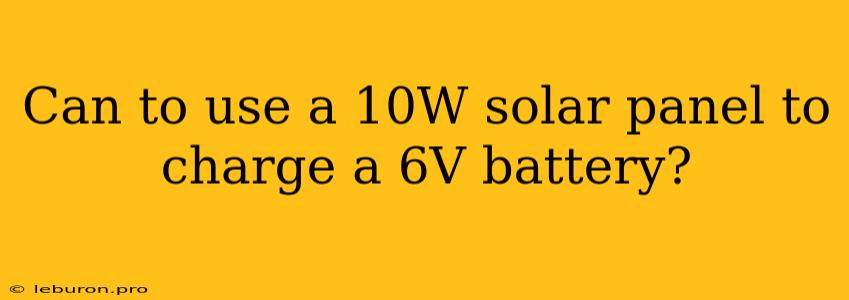Can You Use a 10W Solar Panel to Charge a 6V Battery?
Solar panels are becoming increasingly popular as a clean and sustainable source of energy. They can be used to power a variety of devices, including small appliances, electronics, and even entire homes. But with so many different types and sizes of solar panels available, it can be difficult to know which one is right for your needs. One common question is whether a 10W solar panel can be used to charge a 6V battery. The answer is yes, but there are a few things you need to consider before you get started.
Understanding Solar Panel Power Output
The power output of a solar panel is measured in watts (W). This number indicates how much energy the panel can generate under ideal conditions. A 10W solar panel can produce up to 10 watts of power when exposed to direct sunlight. However, the actual power output will vary depending on factors such as the angle of the sun, the amount of cloud cover, and the temperature.
Battery Voltage and Capacity
Batteries are rated by their voltage and capacity. The voltage of a battery indicates the amount of electrical potential energy it stores. A 6V battery has a voltage of 6 volts. The capacity of a battery, measured in amp-hours (Ah), indicates how much charge it can hold. A higher capacity battery can store more charge and will last longer on a single charge.
Matching Solar Panel Output to Battery Voltage
To charge a 6V battery effectively, you need a solar panel that can produce a voltage higher than 6V. This is because the charging process requires a voltage difference between the solar panel and the battery. If the solar panel's voltage is too low, the charging current will be very small, and the battery may not charge at all.
Using a Charge Controller
A charge controller is an essential component in a solar charging system. It regulates the flow of current from the solar panel to the battery. This helps to prevent overcharging, which can damage the battery. A charge controller also ensures that the battery is charged at the optimal rate.
Calculating Charging Time
The time it takes to charge a battery with a solar panel depends on several factors, including:
- Solar panel power output: A higher power output solar panel will charge the battery faster.
- Battery capacity: A larger capacity battery will take longer to charge.
- Sun intensity: The amount of sunlight available will impact the charging speed.
- Charge controller efficiency: Different charge controllers have different efficiencies.
Charging a 6V Battery with a 10W Solar Panel
To charge a 6V battery with a 10W solar panel, you will need:
- A 10W solar panel: This will provide enough power to charge the battery.
- A charge controller: A charge controller specifically designed for 6V batteries is needed to ensure proper charging.
- A 6V battery: Choose a battery with a capacity that meets your needs.
Here's how the charging process works:
- Connect the solar panel to the charge controller: The solar panel should be connected to the charge controller's input terminals.
- Connect the charge controller to the battery: The charge controller's output terminals should be connected to the battery's terminals.
- Expose the solar panel to sunlight: The solar panel should be positioned to receive maximum sunlight.
- Monitor the charging process: The charge controller will regulate the charging current and prevent overcharging.
Considerations for Using a 10W Solar Panel for 6V Battery Charging
- Charging Time: A 10W solar panel will charge a 6V battery relatively slowly. The charging time will depend on the battery's capacity and the amount of sunlight available.
- Battery Size: A 10W solar panel may be suitable for charging smaller 6V batteries. For larger batteries, you may need a higher wattage solar panel.
- Weather Conditions: The charging time will be significantly affected by weather conditions. Cloudy days or periods of shade will significantly slow down the charging process.
Conclusion
A 10W solar panel can be used to charge a 6V battery, but it's essential to consider the factors discussed above. Ensure you have the right charge controller and understand that charging times may be longer, especially in less-than-ideal weather conditions. Remember to monitor the charging process and check the battery's charge level regularly to ensure optimal performance. With careful planning and the proper equipment, a 10W solar panel can effectively and sustainably power your 6V battery-powered devices.
